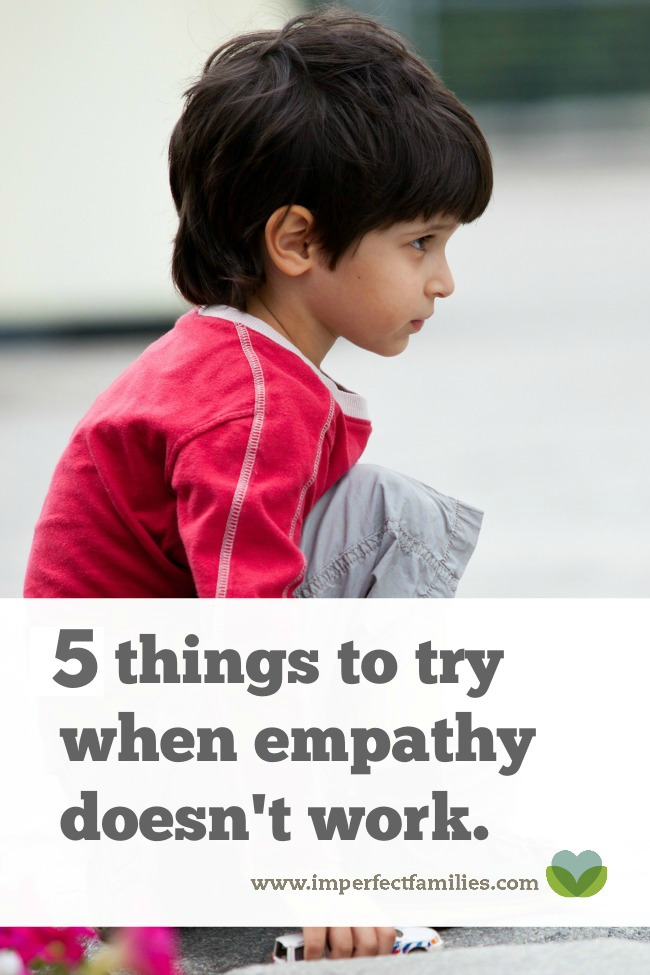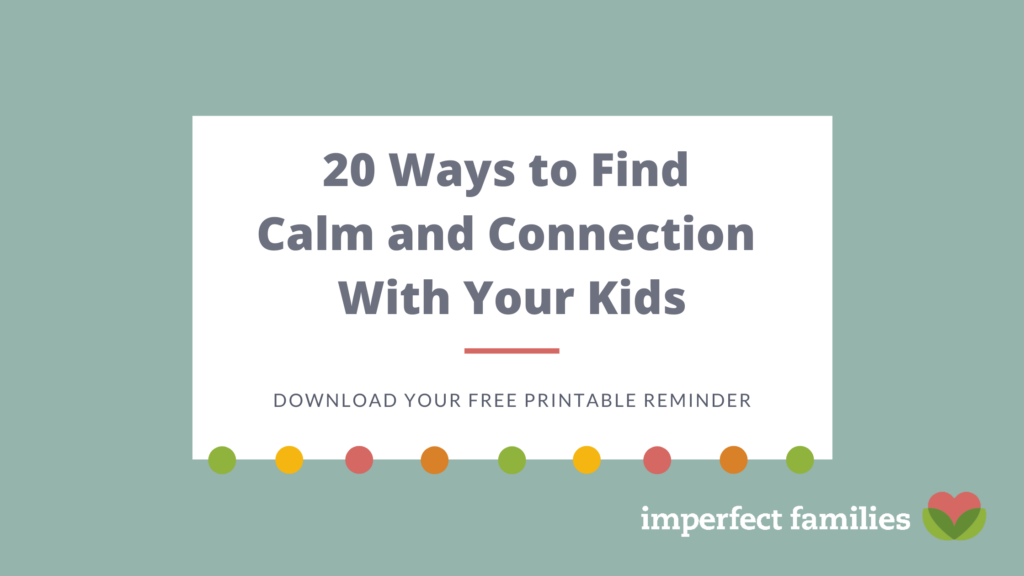
“You seem pretty upset about my decision.”
His eyes glare at you.
Moving in to provide comfort, he swats you away yelling, “leave me alone!”
You’re confused, hurt, and getting more upset by the minute.
We’re told that empathy is the best response. The “magic bullet” of parenting techniques.
Well…it’s not working.
So, now what?
What to Try When Empathy Doesn’t Work
Before you give up on empathy altogether, here are 5 situations when empathy seems to gets off track, and a suggestion for what to do next!
“See, he’s still mad!” The goal of empathy is not to stop a person from feeling a big feeling. Empathy is about getting into the other person’s world. Seeing things from their perspective, as if you are feeling the feeling yourself. It’s about joining them in their big feelings.
- Tip #1: Experiment with your response. Change your tone of voice or body language to match your child’s needs. Do they need to see you mirror their big feeling or do they need you to be a calm center in their feelings of chaos? How would you like someone to respond to you?
“She says, ‘I’m not angry!'” Repeating the same phrase can get annoying. It’s easy to get stuck in a pattern, believing that if we just found the right words, our child would calm down. Unfortunately, our repetitive responses can perpetuate or even make the situation worse!
- Tip #2: Be silent. Really. When your child is at the height of a big feeling, their sensory system is completely overwhelmed. Rather than adding additional stimulation, back up a little, showing support and kindness with your facial expressions rather than words.
“He still won’t settle down!” Feelings can persist, even when someone shows empathy. In some situations, a caring response helps a child calm down and move forward. But sometimes, empathy opens the floodgates, giving permission to cry or express these big feelings.
- Tip #3: Give your child time. It can take up to 20 minutes for the brain to return to a calm state. Rather than trying to rush this process, take a deep breath. Realize that your child wants the big feelings to go away just as much (or more!) than you do.
“She’s even more upset now!” Aggression is a sign that your child is dysregulated. It’s easy to shift focus when your child hits, bites or kicks. Instead of being empathetic, you want to stop this behavior, teach a lesson, or give a consequence.
- Tip #4: Offer boundaries with kindness. True empathy in these tough moments means that you realize the struggle is real for your child. The feelings inside are so overwhelming they cannot manage any better. They need you to acknowledge this while at the same time, providing safety.
“I can’t do this! I’m done.” Your own feelings of frustration may get in the way of doing empathy well. It’s ok to feel upset, hurt, or confused when your child’s big feeling continue, but when these feelings hijack the conversation, your child loses your support.
- Tip #5: Get your own stuff in check. Learn to recognize your own frustrations and triggers. If possible, examine why you are feeling upset. What do you need to stay present with your child? Some fresh air? A deep breath? A sip of water?
It’s not easy to stay present when your child is expressing big feelings. It’s normal to want these uncomfortable situations to stop.
Thankfully, empathy is more than just a “nice” thing to do.
The more often you respond with calm, confident empathy, your child’s brain is learning:
- Big feelings may be scary and overwhelming, but my caregiver is present and there to help.
- There are words and descriptions to these big feelings.
- Everyone feels these feelings sometimes and I am not “going crazy.”
- There are options, a way out of these big feelings.
- I can be empathetic to others.
RELATED: What to Do When Your Child Will Not Calm Down
Taking the cues from your son, you back up. You sit on the edge of the bed, arms outstretched. Saying nothing.
He continues to scowl at you from the corner.
You tell yourself that his brain is overwhelmed and threatened. You can imagine how scary that would be. Your face softens, lowering your eyes, you start to feel sad.
After a few minutes, you quietly say, “I wonder if you feel sad?”
Tears fall down his cheeks. He crawls across the floor to your lap.
Still in shock, you pull him close, thankful that you made it through.
Maybe empathy really does work.
Print these Reminders!
Download your FREE reminder of the options you have when empathy doesn't seem to work from Nicole Schwarz, LMFT & Parent Coach, plus you'll also receive weekly parenting tips sent to your inbox!
By signing up to receive this freebie, you agree to my Disclosure and Privacy Policy.




Comments have been turned off to retain the privacy of all families. If you have a question or comment on the topic, you're always welcome to contact me.